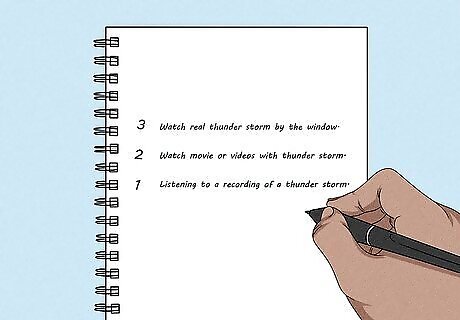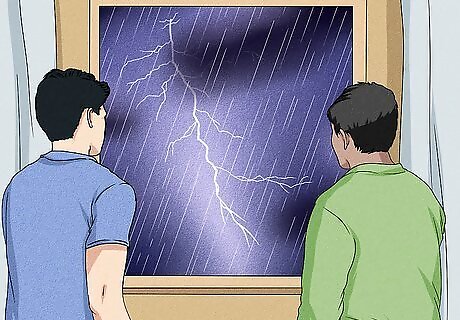
views
X
Research source
Using Gradual Exposure

Learn coping tools. Because a fear can cause you to experience feelings of anxiety and even panic, it is important to learn coping tools before you start exposing yourself to your fear. Choose a coping tool that helps you relax and practice it daily as well as any time you feel anxious. Some good tools to learn include: Deep breathing Progressive muscle relaxation Meditation Listening to soothing music Wrapping yourself in a security blanket Retreating to a “safe place” in your house

Create a ranked list of your fears. You probably have situations in mind that would cause you to be more fearful and anxious than other situations. Make a list of your fears in order from least frightening to most frightening. Then, use this list to guide you through your exposures. For example, least frightening on your list might be listening to a recording of a thunder storm, while the most frightening on your list might be to stand by a window inside of your home and watch a real thunder storm.

Expose yourself to the first level on your list. When you feel ready, you can expose yourself to the lowest ranking item on your list. It is important to choose the least frightening item so that you can gain confidence to move on to the other more frightening items on your list. For example, if your lowest ranked item was listening to a recording of a thunder storm, then you could start by listening to recordings of storms. This exposes you to the thing you fear (the thunder) without actually putting you in direct contact with it. After you have successfully exposed yourself to one item on your list, you can move on to the next one.

Use a coping tool to reduce anxious feelings. As you expose yourself to items on your list, make sure that you use your coping tool to help you relax. This will help you to expose yourself for longer and feel more confident in your ability to face other items on your list. For example, if your coping tool is deep breathing, then make sure that you do some deep breathing as soon as you start to feel any anxiety or fear.
Enlisting Professional Help

Talk to a therapist. A professional therapist is a great person for you to talk to about your phobia of thunder. Just talking about your fears to a trained professional can be beneficial. But a therapist will also be able to help you figure out exercises that will get you to start moving toward overcoming your fear.

Get hypnosis. Listening to hypnosis tapes while you sleep (those that are geared specifically towards fear of thunder) or getting hypnotized by a professional hypnotist is a great step toward overcoming your fear of thunder. When you sleep, your unconscious mind is more susceptible to reprogramming your associations. So if you associate fear with thunder, it will be easier to change this perception through hypnosis while you sleep. Hypnosis geared towards overcoming the fear of thunder should help you take longer to notice when storms are brewing and to feel calm, rather than panic, at the sound of thunder.

Participate in cognitive-behavioral therapy. This kind of therapy specifically focuses on retraining the brain to replace negative thought processes with more positive (and appropriate) ones. Over time, cognitive-behavioral therapy can work to significantly reduce the amount of fear you feel when you hear thunder. With cognitive-behavioral therapy, you will learn self-affirmations to soothe yourself with during storms and visualization exercises to help calm your panic and fear in the moment.
Using Supportive Measures

Drown out the noise. Drowning out the noise can be a helpful tool, especially in the beginning of your journey. It offers a way to distract yourself and hopefully forget your fear, but it does not necessarily work at the root of the of the problem. You can try turning up the volume on the television, listening to music on your headphones, playing an instrument, or making any other sound that will prevent you from hearing the thunder.

Limit how often you look at weather forecasts. People who are afraid of thunder often check the weather forecasts obsessively, especially before they leave their house, because they are afraid of being caught off-guard by a storm when they are not at home. If you don’t know when a storm will come, this may cause you to encounter one when you aren’t 100% prepared. This could eventually help you start overcoming your fear of thunder because you’ll get through the fear episode without the safety net of your own home and the memory of that will stick with you.

Reduce the amount of “protection” you use when you hide. If you tend to hide when you hear the sounds of thunder, try to consciously limit the number of things you use to hide with and feel more secure. For example, if you usually use a blanket to cover yourself, try using a smaller blanket that only covers part of your body. Or, if you usually hide in a dark room with the door closed, try leaving the door cracked open. The key is to make some noticeable effort at using less “protection” so that you will see that you survived without when the fear passes.

Ask a friend to observe a storm with you. Sometimes we feel safer just being in the presence of someone we love and trust. A good step towards overcoming your fear of thunder would be to ask a friend or family member to help you work on this. At first, your friend might just sit inside with you during a storm. But you might try to progress toward watching the storm through the window with your friend or even standing on the porch with your friend while the storm passes.


















Comments
0 comment